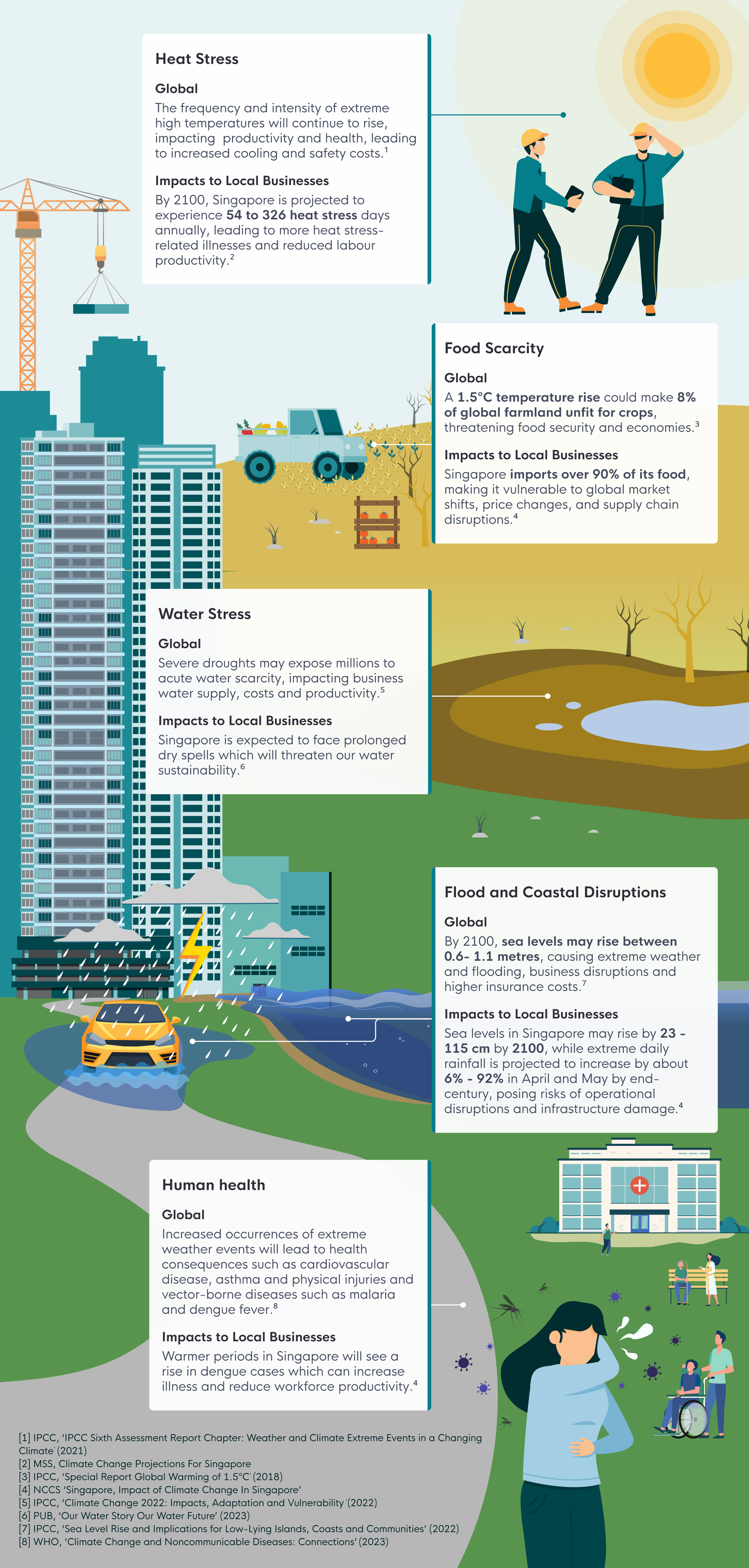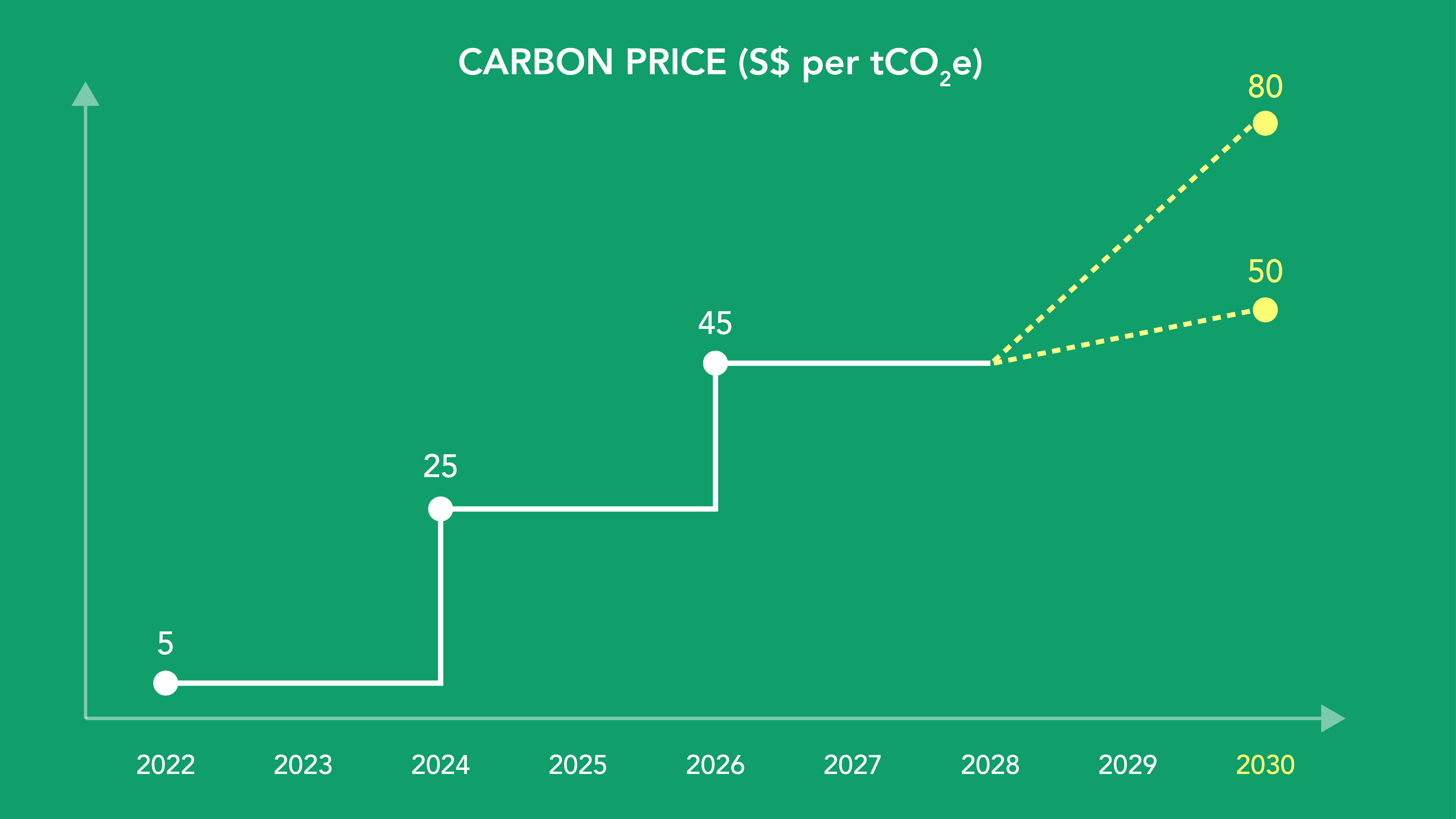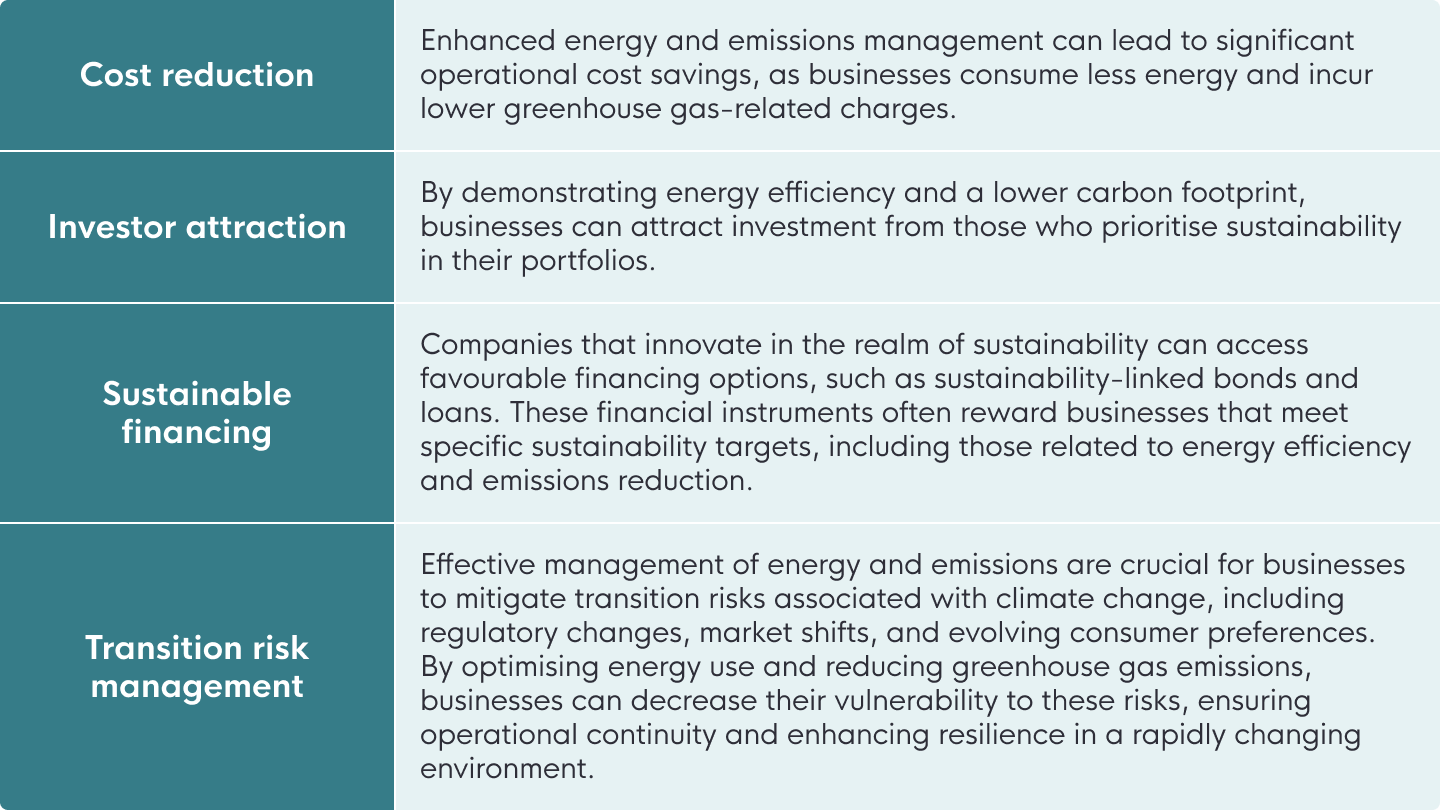Stage 1 (LEARN): Building awareness
Learn about carbon emissions, their impacts on businesses and the benefits of effective energy and emissions management.
1.1 Understanding carbon emissions and why it matters
Greenhouse gases (GHGs) are gases in the Earth's atmosphere that warm our planet by trapping heat. While they are crucial for maintaining Earth's temperature, an excess of GHGs caused by human-induced activities like the burning of fossil fuels and deforestation can lead to global warming and exacerbate the effects of climate change.

DID YOU KNOW?
There are seven key types of GHGs, each with a unique Global Warming Potential (GWP). GWP is used to indicate how much a GHG warms the Earth compared to carbon dioxide over an equivalent period. Find out more about how these affect your emissions in stage 2.

* Hydrofluorocarbons (HFCs) are a group of compounds containing carbon, fluorine and hydrogen while Perfluorocarbons (PFCs) are a group of compounds containing carbon and fluorine.
 The rise in GHG emissions has been a significant driver for the increase in Earth's temperatures. This warming trend is expected to intensify weather phenomena, leading to severe heatwaves, increased precipitation and more potent storms, along with coastal flooding from elevated sea levels. Consequently, these climatic disruptions pose substantial threats to agriculture, infrastructure, and economic systems, potentially disturbing global supply chains and impacting businesses and livelihoods across the planet.
The rise in GHG emissions has been a significant driver for the increase in Earth's temperatures. This warming trend is expected to intensify weather phenomena, leading to severe heatwaves, increased precipitation and more potent storms, along with coastal flooding from elevated sea levels. Consequently, these climatic disruptions pose substantial threats to agriculture, infrastructure, and economic systems, potentially disturbing global supply chains and impacting businesses and livelihoods across the planet.
*Climate Change refers to a change of climate which is attributed directly or indirectly to human activity that alters the composition of the global atmosphere which is in addition to natural climate variability observed over comparable time periods.
Source: United Nations Framework Convention on Climate Change
Climate risk and the impact to local businesses

1.2 Increasing regulatory pressures on businesses to manage carbon emissions
International climate agreements are shifting global practices
In response to the significant climate risks, international climate agreements have been established to curb climate change and mitigate its impacts. Adopted at the United Nations Climate Change Conference (COP21) in 2015, the Paris Agreement is a legally binding international treaty on climate change, which has been ratified by more than 190 countries (including Singapore). Its goal is to limit the rise in average global temperature to well below 2 degrees Celsius, and to pursue efforts to limit this further to 1.5 degrees Celsius, compared to pre-industrial levels.
Since then, a growing coalition of companies, cities, regions, financial, educational, and healthcare institutions have joined the pledge to achieve net-zero emissions. The Asia-Pacific has emerged as the region with the fastest-growing number of entities joining the UN Race to Zero campaign, with SMEs making up over half of the campaign's members. These international pressures and commitments underscore the global recognition of the urgent need to address climate risks and transition towards a sustainable, low-carbon future.
What does this mean for Singapore?
As a small island city, climate change is an existential challenge for Singapore. Although Singapore contributes only 0.1% of global emissions, Singapore is taking firm actions to do our part in mitigating climate change. Under climate targets submitted to the UN, Singapore has committed to reduce emissions to around 60 million tonnes of CO₂ equivalent (MtCO2e) in 2030, to between 45 and 50 MtCO2e by 2035, and to achieve net-zero emissions by 2050.
While Singapore is disadvantaged in adopting alternative renewable energy sources, we are pushing ahead with decarbonisation efforts across different sectors of the economy, including improving energy efficiency in industries, households and buildings, as well as to green local transportation. Find out more about Singapore's efforts in Singapore’s First Biennial Transparency Report.
Carbon tax in Singapore and implications on local businesses
Carbon tax and emissions trading schemes are important tools to support the transition to a low-carbon economy, with more than 70 such schemes in operation worldwide1. According to the World Bank’s 2024 report, the number of carbon taxes and emissions trading schemes in operation worldwide currently stands at 75, covering around 24% of global emissions, with promising signs of uptake from middle-income countries.
In support of our net-zero commitment, Singapore has introduced a carbon price since 2019. The carbon tax sets a clear economic signal for businesses and consumers to reduce their carbon emissions and shift away from carbon-intensive goods and services. About 80% of our total greenhouse gas (GHG) emissions are covered by carbon tax and fuel excise duties on our transport fuels. The carbon tax covers around 70% of our total emissions and is levied on large emitters from the manufacturing, power, waste, and water sectors.
Although the carbon tax is directly levied upstream on large emitters, SMEs are indirectly impacted by the carbon tax as they could face higher costs for utilities such as electricity, as well as raw materials due to upstream price adjustments. This helps SMEs maintain competitiveness in a low-carbon future through reducing their energy consumption, improving energy efficiency and adopting renewable energy solutions. Find out more about Singapore's Carbon Tax.


DID YOU KNOW?

| The carbon tax level was set at S$5/tCO2e for the first five years from 2019 to 2023 to provide a transitional period for emitters to adjust and was raised to S$25/tCO2e from 2024. | The carbon tax will be subsequently raised to S$45/tCO2e in 2026 and 2027, with a view to reaching S$50-80/tCO2e by 2030. |


Mandatory climate reporting aligned with the ISSB standards
Internationally, an increasing number of jurisdictions are mandating climate reporting for large companies. This creates a trickle-down effect, whereby SMEs, which are part of the supply chains of larger companies, will eventually be required to provide ESG data.
Locally, Singapore will institute mandatory climate-related reporting in phases. The mandate requires listed and large non-listed companies to report their climate-related disclosures in alignment with standards by the International Sustainability Standards Board (ISSB), a global accounting standards body. As business partners are likely to increasingly request climate and sustainability-related performance data from their suppliers, it will be beneficial for SMEs to start compiling their data in a consolidated manner. Explore our page on Sustainability Reporting page for more information.
Resources for you
Trainings - Carbon Emissions and Energy Management
Decarbonisation for Singapore Enterprises: Playbook
LowCarbonSG
Sustainability Reporting
1.3 Benefits of proper energy and emissions management
Proper energy management can make good business sense. The benefits of practicing effective energy and emissions management can yield many positive outcomes such as:

- World Bank Group, 'State and trends of carbon pricing' (2024)